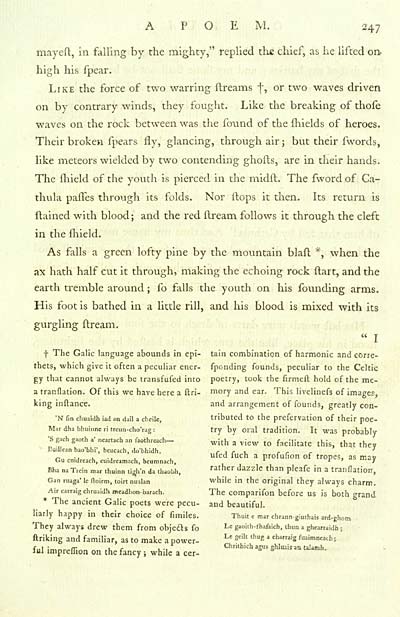Blair Collection > Galic antiquities
(123)
Download files
Complete book:
Individual page:
Thumbnail gallery: Grid view | List view

A
O E M.
247
niayefl, in falling by the mighty," replied the chief, as he lifted on.
high his fpear.
Like the force of two warring flreams f, or two waves driven
on by contrary winds, they fought. Like the breaking of thofe
waves on the rock between was the found of the fliields of heroes.
Their broken fpears fly, glancing, thi'ough air ; bvit their fwords,
like meteors wielded by two contending ghofts, are in their hands.
The fliield of the youth is pierced in the midft. The fword of Ca-
thula palTes through its folds. Nor ftops it then. Its return is
flained with blood; and the red flream follows it through the cleft
in the fliield.
As falls a green lofty pine by the mountain blaft *, when the
ax hath half cut it through, making the echoing rock ftart, and the
earth tremble around ; fo falls the youth on his founding arms.
His foot is bathed in a little rill, and his blood is mixed with its
gurgling flream.
f The Galic language abounds in epi- tain combination of harmonic and corre-
thets, which give it often a peculiar ener- fponding founds, peculiar to the Celtic
poetry, took the (irmeft hold of the me-
mory and ear. This livelinefs of images,
and arrangement of founds, greatly con-
tributed to the prefervation of their poe-
try by oral tradition. It was probably
with a view to facilitate this, that they
ufed fuch a profufion of tropes, as may
rather dazzle than pleafe in a tranflation,
while in the original they always charm.
The comparifon before us is both grand,
and beautiful.
Thuit e mar chrann giuihais ard-ghom
Le gaoith-fhafaich, thun a ghearraidh ;
Le gcilt thug a charraig fuaimneach;
Chrithich agus ghluais an talamh.
gy that cannot always be transfufed into
a tranflation. Of this we have here a ftri-
king inftance.
'N (in chuaidh iad an dail a cheile,
Mar dha bhuinne ri treun-cho'rag :
'S gach gaoth a' neartach an faothreach —
Buillcan bao'bhi', beucach, do'bhidh.
Gu cnidreach, cuidreamach, beumnach,
Blia na Trein mar thuinn tish'n da thaobh,
Gan ruaga' le floirm, toirt nualan
Air carraig chruaidh meadhonbarach.
* The ancient Galic poets were pecu-
liarly happy in their choice of fimiles.
They always drew them from objeds fo
ftriking and familiar, as to make a power-
ful imprefllon on the fancy ; while a cer-
O E M.
247
niayefl, in falling by the mighty," replied the chief, as he lifted on.
high his fpear.
Like the force of two warring flreams f, or two waves driven
on by contrary winds, they fought. Like the breaking of thofe
waves on the rock between was the found of the fliields of heroes.
Their broken fpears fly, glancing, thi'ough air ; bvit their fwords,
like meteors wielded by two contending ghofts, are in their hands.
The fliield of the youth is pierced in the midft. The fword of Ca-
thula palTes through its folds. Nor ftops it then. Its return is
flained with blood; and the red flream follows it through the cleft
in the fliield.
As falls a green lofty pine by the mountain blaft *, when the
ax hath half cut it through, making the echoing rock ftart, and the
earth tremble around ; fo falls the youth on his founding arms.
His foot is bathed in a little rill, and his blood is mixed with its
gurgling flream.
f The Galic language abounds in epi- tain combination of harmonic and corre-
thets, which give it often a peculiar ener- fponding founds, peculiar to the Celtic
poetry, took the (irmeft hold of the me-
mory and ear. This livelinefs of images,
and arrangement of founds, greatly con-
tributed to the prefervation of their poe-
try by oral tradition. It was probably
with a view to facilitate this, that they
ufed fuch a profufion of tropes, as may
rather dazzle than pleafe in a tranflation,
while in the original they always charm.
The comparifon before us is both grand,
and beautiful.
Thuit e mar chrann giuihais ard-ghom
Le gaoith-fhafaich, thun a ghearraidh ;
Le gcilt thug a charraig fuaimneach;
Chrithich agus ghluais an talamh.
gy that cannot always be transfufed into
a tranflation. Of this we have here a ftri-
king inftance.
'N (in chuaidh iad an dail a cheile,
Mar dha bhuinne ri treun-cho'rag :
'S gach gaoth a' neartach an faothreach —
Buillcan bao'bhi', beucach, do'bhidh.
Gu cnidreach, cuidreamach, beumnach,
Blia na Trein mar thuinn tish'n da thaobh,
Gan ruaga' le floirm, toirt nualan
Air carraig chruaidh meadhonbarach.
* The ancient Galic poets were pecu-
liarly happy in their choice of fimiles.
They always drew them from objeds fo
ftriking and familiar, as to make a power-
ful imprefllon on the fancy ; while a cer-
Set display mode to: Large image | Transcription
Images and transcriptions on this page, including medium image downloads, may be used under the Creative Commons Attribution 4.0 International Licence unless otherwise stated. ![]()
| Early Gaelic Book Collections > Blair Collection > Galic antiquities > (123) |
|---|
| Permanent URL | https://digital.nls.uk/75778547 |
|---|
| Description | A selection of books from a collection of more than 500 titles, mostly on religious and literary topics. Also includes some material dealing with other Celtic languages and societies. Collection created towards the end of the 19th century by Lady Evelyn Stewart Murray. |
|---|
| Description | Selected items from five 'Special and Named Printed Collections'. Includes books in Gaelic and other Celtic languages, works about the Gaels, their languages, literature, culture and history. |
|---|

